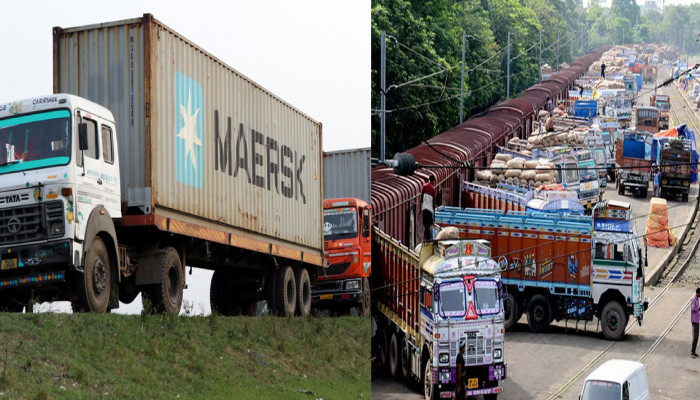India eases weight restrictions on Nepali cargo trucks on Asian highway
- In Reports
- 06:30 PM, Jan 13, 2025
- Myind Staff
India has agreed to remove weight restrictions on cargo trucks in the Kakarbhitta-Fulbari-Banglabandha corridor. This will allow Nepali freight to be treated the same as Indian freight. This decision was made during a meeting held on Friday in Kathmandu between Nepal and India’s Inter-Governmental Committee (IGC) on Trade, Transit, and Cooperation to Control Unauthorised Trade.
The Indian side confirmed that, as per current regulations, the maximum axle weight of 18.5 tonnes for two-axle vehicles and 28 tonnes for three-axle vehicles will also apply to Nepali vehicles using the corridor. By strengthening collaboration between the Bureau of Indian Standards (BIS) and the Nepal Bureau of Standards and Metrology, the two nations also committed to advancing the mutual recognition, certification, testing and quality determination of goods. India has promised to expedite the process of renewing the permits and granting fresh BIS certification for Nepali commodities supplied to India, according to a statement released by Nepal's Ministry of Industry, Commerce and Supplies.
"We raised the BIS certification issue seriously during the meeting, as the export of Nepali cement, plywood, footwear, zinc sheets, and other goods to India has been halted for months due to delays and non-renewal of BIS certificates," said Gobinda Bahadur Karkee, secretary at the industry ministry. India allegedly consented to provide this procedure priority and support. Karkee from Nepal and Sunil Barthwal, the Secretary at India's Ministry of Commerce and Industry, led the meeting.
During the discussion, India agreed to finalise the letter of exchange proposed by Nepal to amend the Nepal-India Transit Treaty. This amendment will allow cargo transport through railway facilities in Biratnagar and Bhairahawa. Nepal also repeated its request to use Mundra Port in Gujarat and Dhamra Port in Odisha, as well as to facilitate the import and export of goods from Kolkata airport to third countries. Both sides agreed to finalise letters of exchange to address any changes in transit routes if issues arise.
Kolkata is the closest seaport to Nepal. In order to provide transit services to Nepal, India and Nepal signed the Treaty of Trade and Transit in 1960. Periodically, this pact is renewed. Nepal and India have agreed to speed up the preparation of a detailed project report (DPR) for two motorable bridges over the Mahakali River to improve trade. These bridges, which will be built with Indian financial support, will connect Jhulaghat in Baitadi and Sirsha in Dadeldhura.
India also responded positively to Nepal's request to add more fruits, flowers, vegetables, and herbs to the list of items allowed for export to India. Currently, only the items listed in the Plant Quarantine (Regulation of Import into India) Order can be exported. In response to appeals from the Nepali side, the Indian side decided to add chayote and sal seeds to the Plant Quarantine Order of India, the Indian Embassy in Kathmandu said in a statement on Sunday.
According to the embassy, the following berry extracts have also been approved for inclusion in the list of processed items [plant products]: Jatamasi root extract, Sugandhkokila berry extract, Sugandhwal rhizome extract, and Timur berry extract. The issues with milk shipments to Nepal were brought up by the Indian side during the bilateral discussion. The Nepali side has agreed to consider India’s request for milk products that are not produced enough in Nepal, such as whey and cheese, the embassy said. Karkee mentioned that Nepal has asked India to fully use the Integrated Check Posts (ICPs) at the Nepal-India borders and create a system where goods can be transported easily. Both sides have agreed to work together on mutual recognition and certification processes, testing, and quality determination of goods through collaboration between Nepal’s Department of Food Technology and Quality Control and India’s Food Safety and Standards Authority.
Harmonising norms for food, quality, and metrology was another topic of discussion. "The Indian side currently does not accept online certificates of origin and requires hard copies. We requested that they accept online certificates to facilitate Nepali exporters," Karkee added. The Unauthorised Trade Control Agreement (2009), the Transit Treaty (2023), and the Trade Treaty (2009) were among the important accords that were thoroughly examined. Additionally, India consented to make it easier to import supplies and equipment needed for projects in Nepal that involve Indian investment. "India reported facing difficulties importing equipment for hydropower projects in Nepal. As the issues related to Nepal's customs department and the finance ministry, we assured them of necessary facilitation," said Karkee. The meeting agreed to make the process of importing livestock-related food items from India simpler, especially for items that aren't produced in Nepal. Both countries decided to quickly address related issues through their respective systems.
Both sides emphasised the importance of regular meetings and discussions to strengthen their trade and investment partnership. India is Nepal's largest trading partner and the main source of foreign investment. It also serves as the transit point for nearly all of Nepal's trade with other countries. According to the commerce wing of the Indian Embassy in Nepal, India is responsible for about two-thirds of Nepal's merchandise trade, one-third of trade in services, one-third of foreign direct investments, almost all of Nepal's petroleum supplies, and a large part of inward remittances. In the last fiscal year, trade between Nepal and India reached Rs1.09 trillion. However, Nepal's exports to India dropped by 3.28 per cent to Rs103.17 billion in 2023-24 compared to the previous year. India's imports dropped to Rs 996.68 billion from Rs1.02 trillion in the previous fiscal year, according to the Department of Customs.







Comments